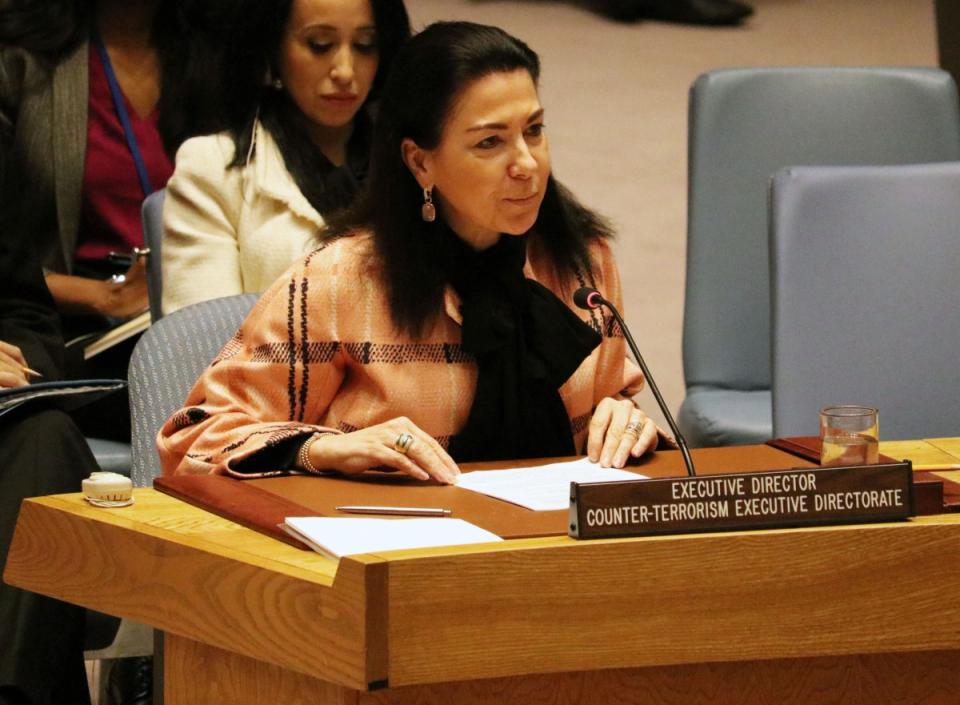
Despite ISIL’s military defeat in the Syrian Arab Republic and the death of its leader, Abu Bakr al-Bagdadi on 27 October 2019, ISIL continues to adapt and evolve. According to the Secretary-General’s tenth report on the threat posed by Islamic State in Iraq and the Levant (ISIL/Da’esh), ISIL has become increasingly focused on its fighters and dependants in Iraq and the Syrian Arab Republic. “The total population of all the detention and displacement facilities in the northeast of the Syrian Arab Republic comprises more than 100,000 individuals. More than 70,000 of them are women and children housed in the Hawl camp.” The report (S/2020/95) was prepared by CTED and the Analytical Support and Sanctions Monitoring Team, in close collaboration with the United Nations Office of Counter-Terrorism, other United Nations entities and international organizations.
In a briefing to the Security Council, Assistant Secretary-General Michèle Coninsx, Executive Director of the Counter-Terrorism Committee Executive Directorate (CTED), said she was deeply concerned about the lack of justice for sexual crimes committed by ISIL. “Women and children abducted by ISIL are not yet reunited with their families. Numerous children conceived through rape lack legal recognition. The culture of impunity for sexual crimes still persists,” she stated. Ms. Coninsx supported the adoption of a survivor-centric and rights-based approach to judicial remedies and reparation efforts to ensure justice for the survivors.
Understanding motivations and drivers of radicalization, especially among female ISIL-associates is complex, particularly as women often had simultaneous role as victims and perpetrators. In September 2019, CTED published two Analytical Briefs on the repatriation of ISIL-associated women and children, highlighting current approaches, challenges, and trends, including that the rate of return of ISIL-associated women remains significantly lower than that of men and children.
“We know that education and awareness are the only way of getting rid of Da’esh,” said Mona Freij, a civil society representative who fled from Raqqa, Syria. Ms. Freij briefed the Security Council about her experiences as a survivor of ISIL rule, and her efforts to heal her community, building resilience against future radicalisation to violence.
Welcoming efforts by some Member States to repatriate and rehabilitate all or some of their nationals, Ms. Coninsx suggested that other States should seek to develop and implement repartition strategies in line with international law and the principle of non-refoulement. She reiterated that the ways in which we address prosecution, repatriation, and rehabilitation efforts now will resonate for generations to come. The “internment of a generation of children neither acceptable nor sustainable,” declared Ms. Coninsx.
CTED has been working with Member States and UN agencies to bring ISIL perpetrators to justice through technical assistance in strengthening national counter-terrorism and countering violent extremism responses. To mitigate prosecution challenges, CTED, together with UNODC, has launched Guidelines to facilitate the use and admissibility as evidence in national criminal courts of information collected, handled, preserved, and shared by the military to prosecute terrorist offences, a joint initiative on electronic evidence, which will facilitate evidence collection and prosecution of terrorism-related offences. “Today, the international community has an opportunity to prosecute the perpetrators, rehabilitate the victims, and facilitate reconstruction and community development in places destroyed by ISIL violence,” said Ms. Coninsx. “This is one of the defining counter-terrorism challenges of our time. Inaction now will only make our future counter-terrorism efforts harder,” she stated.
You can watch the full briefing here.

